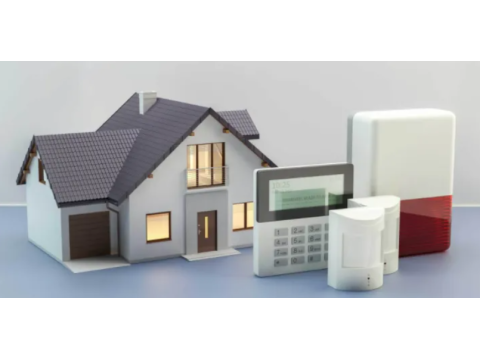Cottage Security Systems: Key Considerations
Choosing the right security system for a cottage involves addressing specific challenges:
- Remote Location: Often far from urban infrastructure.
- Power Reliability: Frequent outages in rural areas.
- Long-Term Absence: Extended periods without supervision.
These factors influence the selection between autonomous systems and GSM-enabled solutions.
Types of Cottage Security Systems
Autonomous Systems:
- Detect intrusions and trigger audible or visual alarms.
- Suitable for cottages in guarded communities where nearby security personnel can respond.
- Basic components include:
- Motion detectors in key areas.
- Sound/light alarms (e.g., sirens).
- Backup power supply.
- Pro Tip: Simulate security with a flashing LED or a dummy system like the “Mayak” beacon for deterrence.
GSM Security Systems:
- Send alerts via SMS or calls to the owner.
- Can include video cameras for visual verification.
- Ideal for constant monitoring when no local responders are available.
- Challenges:
- Weak cellular signals in remote areas (solutions: dual-SIM systems, GSM repeaters).
- Vulnerability to signal jamming.
Wired vs. Wireless Cottage Security
Wired Security Systems
- Pros:
- Affordable and reliable.
- Continuous connection ensures consistent performance.
- No need for frequent battery replacements.
- Cons:
- Labor-intensive installation.
- Visible wiring may not suit modern interiors.
- Best For: Permanent cottages where wiring can be concealed during construction or renovation.
Wireless Security Systems
- Pros:
- Easy to install.
- Ideal for temporary setups or when wiring is impractical.
- Cons:
- Higher initial cost.
- Requires regular battery maintenance.
- Compatibility issues with equipment from different brands.
- Best For: Seasonal cottages where flexibility is key.
GSM Security System Kits for Cottages
Most kits include:
- Control Panel: Core unit with a GSM module.
- Motion Detectors: Covering critical areas.
- Door/Window Sensors: Monitoring entry points.
- Alarms: Audible and visual alerts.
- Optional Extras: RFID readers, remote controls, and cameras.
Common Questions About Cottage Security
Are siren-based alarms effective for cottages?
- In isolated locations, sirens offer minimal deterrence due to the lack of nearby responders. GSM systems with instant alerts are more practical.
How does autonomous security work for cottages?
- Autonomous systems typically feature self-contained sensors and alarms. They rely on power-efficient designs but may not perform well without external power for extended durations.
Can I integrate cameras into my cottage’s security system?
- Yes, many GSM systems support camera integration. However, GSM networks may not support live video streaming, limiting you to still images or short clips.
What’s the most practical security setup for a cottage?
- Recommendation: GSM systems with motion detectors in all rooms and door/window sensors on entry points. For enhanced security, consider adding cameras and backup power solutions.
Conclusion
Securing your cottage requires a tailored approach that addresses its unique challenges. GSM systems are a versatile and practical solution, offering remote monitoring and alerts. For reliable and affordable options, visit safsale.com to explore our wide range of cottage security solutions.
Garage Security Systems
13/01/2025
Choosing a Home Security System
13/01/2025

